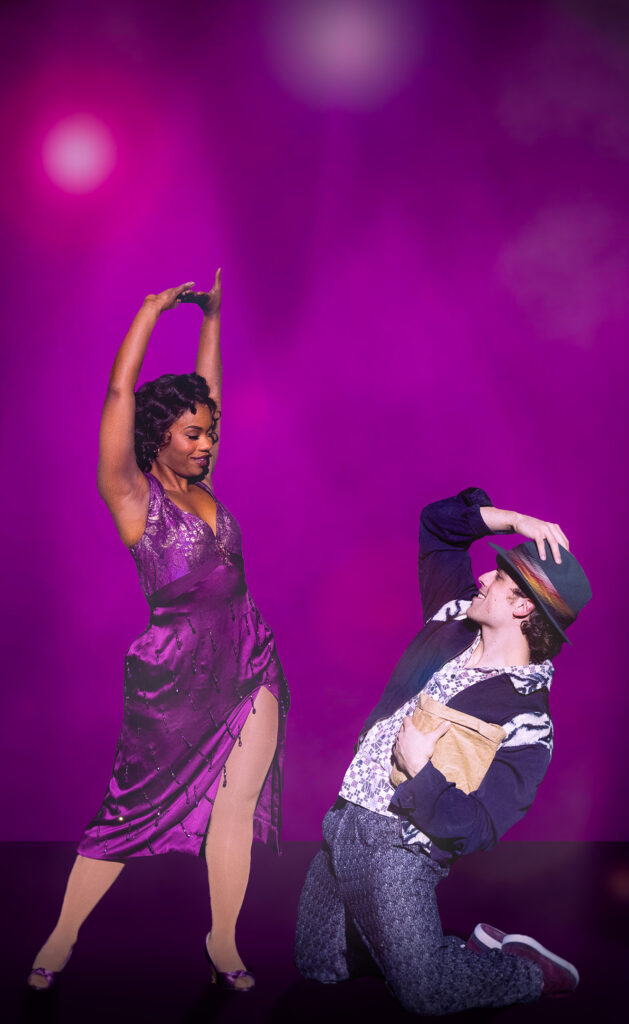
Sydney Arcnibald and Samuel Cadieux rev it up in LPAC’s Memphis
By Aaron Krause
Almost 15-and-a-half years after its Broadway debut, the multi-Tony Award-winning musical, Memphis still provides a rousing good time and offers messages that keep the show as fresh as recently baked bread.
Without hammering us over the head too much, Memphis reminds us that change does not come easy. However, hope exists when people such as reform-minded Huey Calhoun populate the world.
While Calhoun is a fictional character, librettist Joe DiPietro’s inspiration came from real-life Memphis disc jockey Dewey Phillps (1926-1968). He was one of the first white DJs to play Black music during the 1950’s.
Lauderhill Performing Arts Center’s believable and energetic production of Memphis, which runs through March 3, “Crazy Little Huey” will leap into your heart and soul. And he will remain with you long after the production at the Lauderhill Performing Arts Center ends. That is because Samuel Cadieux triumphantly portrays him as a dynamic and positive fella who badly wants to change the world for the better.
Cadieux and a lively large cast featuring several recognizable faces win us over with vivacious performances that also seem natural.
Under Michael Ursua’s assured direction, the triple threat performers engage us, while the show’s vibrant score energizes us.
South Florida theatergoers may recall fairly recent regional productions of Memphis in South Florida. Specifically, Slow Burn Theatre Company and Actors’ Playhouse at the Miracle Theatre staged strong productions in 2018 and 2019, respectively.
Memphis fits original, 1950s-style rock music and club dancing into a roughly two-and-a-half hour show, including a 15-minute intermission.
The musical touches on such topics as racism, ambition, as well as the ability of music to unite and heal. In addition, the power of sincere, mutual love (however forbidden) is central in this show.
Of course, the musical takes place in Memphis during the 1950s. At Delray’s, an African American night club, Black men and women are enjoying music. At first, they are unaware that an awkward little white man is among them and that the music to which they are listening is nourishing his soul. He introduces himself as Huey Calhoun and sings that the music that is playing is “The Music of My Soul.”
Certainly, in the segregated South during the 1950s, it is unusual for Black and white folks to mingle. So, the club’s regulars feel uncomfortable with a white person around. Before long, they feel even more unease after Calhoun sets his eyes on club owner Delray’s younger sister, Felicia.
The pairing of Huey and Felicia represents a forbidden relationship. In 1950, lawmakers passed the Immorality Act, which criminalized sexual relations between whites and non-whites. Understandably, Delray does not want Huey around his sister. Unlike the idealistic Huey, the realistic Delray is fiercely protective.
“My parents died young, they died poor,” Delray sings. “They left me with my sister, not much more. She had this voice like none I knew, so I opened up my club, what else could I do?”
Still, Huey wishes to marry Felicia. He also wants to get her songs on the radio and play race music for whites and African Americans.
Despite the obstacles, which produce strong conflict, a determined Huey perseveres. And before long, the little man makes a name for himself in the Memphis music scene, delighting people of both races.
Before too much longer, a talent agency in New York reaches out to Felicia. They’ve discovered her talent and wish to work with her. For more than one reason, it appears that moving to New York would be a wise decision for the couple. Felicia would expose her music to a wider audience and the couple wouldn’t have to get together in secret; laws against mixed race couples didn’t apply up north.
But Huey is hesitant to leave his beloved hometown of Memphis.
“There’s a town that I call home where all the streets are paved with soul,” he sings. “Down on Beale, there’s a honkey-tonk bar, hear the wail of a blues guitar. Have a beer and drop a dime in a blind man’s jar. The blues sing softly in the air, like a Sunday morning prayer. Just one more drink and you’ll see God everywhere. Like a sad old melody – tears you up but sets you free. That’s how Memphis lives in me… I couldn’t even try to run away, say goodbye. Here I was born, and here is where I’ll die.”
It’s ironic that Huey, who wants to change society, won’t agree to the kind of change that would make his beloved happy. In fact, his refusal to move to New York could lower your opinion of him just a bit.

Samuel Cadieux
Still, Huey is an admirable character, and Cadieux endearingly portrays him. His fast-talking Huey, who speaks in a sing-songy voice, has an easy-going confidence and charisma. In addition, Cadieux imbues Huey with a winning combination of sincerity, charm, and idealism that attracts you to him. Certainly, with these traits, it’s obvious why Felicia would want to be with him.
As Huey, a fresh-faced Cadieux sports brownish wavy, uncombed hair and a fedora. Also, the actor possesses a pleasant, strong and expressive singing voice. In addition, the performer is nimble.
Cadieux and Sydney Archibald, as Felicia, share an admirable chemistry together. And speaking of Felicia, Archibald makes her charming and modest, but also eager and ambitious. In addition, Archibald proves to be a strong R&B belter and dancer. Further, she commands the stage during numbers such as “Colored Woman.” In the song, she sings that she will fight to make her dreams come true despite her skin color.
“I’ll do what mamma never even dared,” she sings. “Colored woman with few chances has to do what she must do. I will make my colored dreams come true.”
As Huey’s prejudiced mother, Gladys, Jodie Langel plays her rigidly at first, but becomes considerably more likable as the production progresses. Langel segues seamlessly from an intolerant and tense person to an accepting and positive individual.
Don Seward has a booming voice and commandingly portrays Felicia’s brother, Delray. And he‘s like a fierce watchdog while protecting his sister. Come to think of it, it’s hard to believe that Delray, as protective as he is of Felicia, would allow his sister to keep seeing Huey after a gang of white people physically hurts them.
TJ Pursley has a smaller role as Gator, but this is a significant character. He hasn’t spoken since he was 5, after he witnessed his father being lynched. When he finally opens his mouth in the show, Pursley’s Gator emits a sound as prayerful as an actor beautifully singing “Bring Him Home” from Les Miserables.
A fine supporting cast excels, including Christopher Dreeson as a strong-willed, uptight Mr. Simmons. He owns the radio station where Huey gets his start.
Bryan Morris also shines as Bobby, lending him personality and heart. The actor puts his strong and expressive voice to good use during Bobby’s solo, “Big Love.”
As an ensemble, this large cast produces heavenly harmonies and executes with flair Alex Jorth’s physical choreography. Since this is a live show, it would have been nice for live musicians to accompany them in song, but recorded tracks ably back the performers.
The behind-the-scenes artists also contribute to the production’s success. Set designer Stephen Gifford has created a two-level structure that includes tall, brick walls and porch-like areas attached to the walls. It’s a minimal set that doesn’t call too much attention to itself and gives the performers plenty of room to move. In addition, the height and hardness of the brick walls could be symbolic; undoubtedly, folks in the 1950’s faced a tall, hard order to bring about equal rights for all.
Lighting designer Preston Bircher’s sometimes dim lighting reinforces a romantic atmosphere for some scenes. And the costumes by NETworks befit the characters who wear them. Some of the costumes sparkle, as do the performers.
As the director, Ursua paces the production well and highlights moving moments in the script. However, some scenes could take place farther downstage so that we could see the performers better. Also, in one of the scenes, Cadieux blocks Seward. But overall, the strengths of this production outweigh the weaknesses.
Memphis’s engaging music, composed by Bon Jovi founding member David Bryan, is one of the show’s several strengths. While you may not find yourself humming the songs a while after you’ve seen the show, the music will invigorate you. And listen for DiPietro’s clever lyrics. His moving libretto (book) includes some gasp-inducing moments and is humorous as well.
Memphis’s themes should speak to audiences regardless of the time period in which they are living. That makes Memphis a classic that theater companies will want to revisit. And don’t be surprised if a Broadway revival comes along in the near future.
Memphis through March 3 produced by Lauderhill Performing Arts Center, The City of Lauderhill and Arts Center Management Theatricals. Performed at Lauderhill Performing Arts Center, 3800 N. 11th Place, Lauderhill.
continues through March 3. For showtimes and tickets, call (954) 777-2055









 A PaperStreet Web Design
A PaperStreet Web Design

2 Responses to LPAC Memphis Remains Vibrant Rousing Thought-Provovoking